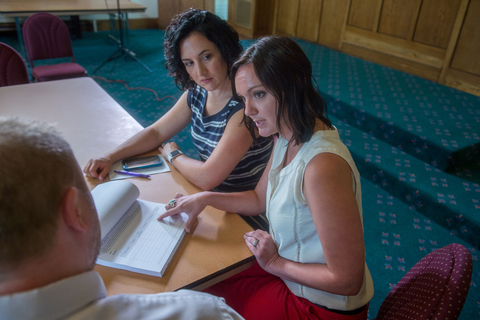Have you ever found yourself sitting in a meeting for over an hour and feeling frustrated because the group is still on the first agenda item … “Committee Reports”?
While keeping committee members informed of the group’s efforts is important and necessary, lengthy reports can leave little time on an agenda to move from old to new business. Plus, research has found people retain less than 20 percent of the information they hear!
To make better use of meeting time and keep members informed but not bored, here are some strategies to try.
1. Manage what information is shared at meetings and when
Send prior to the meeting. Ask committee members to read reports prior to the meeting so they have time to reflect and understand the information. Any supplemental information should be sent along with the committee reports. Examples may be news releases or brochures about upcoming events. Allow only a few minutes on the agenda to clarify any information regarding these types of items.
Use the 3 D’s to clarify and focus the agenda items. When creating the meeting agenda, consider the purpose of the agenda item and the expectation of committee members. A helpful tip is to name after the agenda item which of the 3 D’s is needed:
- Discussion – Do we need to talk about this?
- Decision - Are we ready to decide this?
- Disseminate – Does this information need to be shared?
Place close to the end of the agenda. Discussion and decision items for the meeting agenda should be the primary focus of the meeting. If the information is not required for other agenda items and decision-making, place the reports close to the end of the agenda rather than at the beginning.
2. Consider alternatives to lengthy committee reports
There are important reasons that committees write reports to the board. With public boards, formal reports become part of the minutes and should be kept for historical and recording value. Reports can also be called upon if a legal issue arises, which makes it ultra-important for committees to document their findings in writing.
However, if the group is more informal and the main reason is to keep the members informed, you might consider using a strategy that keeps reports brief and to the point. Some ideas include:
- W-H Questions: Create a template for giving short written reports. In 1-2 sentences, committee members answer the questions why, what, when, who, and how.
- Headlines: Ask committee members to write information in headline form — capturing the essence of the information in 13 words or less. Headlines may be written and posted (choose where that will be) or shared verbally.
- Start-Stop-Alert: Use these three terms and ask committee members to quickly share: a) what’s starting or what’s new, b) what’s stopping or what’s at an end, and c) what to be on alert for or what’s on the horizon.
3. Use engagement techniques to improve information retention
If you must devote a significant amount of time to sharing certain information, engage members to inspire interest and improve retention. For example:
- Main points check: Encourage members to actively respond to information in a way that will help them process it. Ask “Who would like to share, in their own words, the main points they heard?” Ask for more than one person to share.
- Survey check-in: Ask “Using a scale of 1 - low to 5 - high, hold up the number of fingers that show your confidence understanding this information.” Observe the responses and ask those on the low end of the scale what questions they still have.
- Highlights/questions: Ask everyone to share at least one thing they felt was good/useful to hear and, if desired, something they have questions about or want to learn more about.
You can find more ideas on effective meetings in the book Committees That Work: Common Traps, Creative Solutions. This 90-page guidebook is for local leaders, educators, community development professionals or anyone who wants to build the capacity of working groups. Order online from U of M Bookstores.


